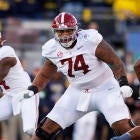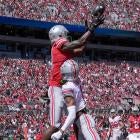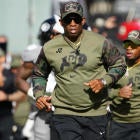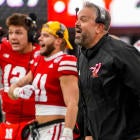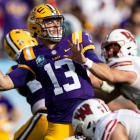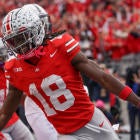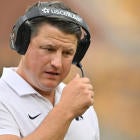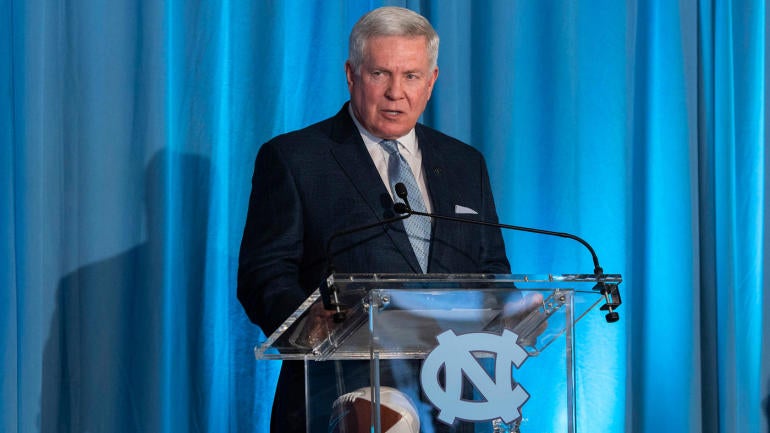
Mack Brown has heard the title the college football underground has assigned to him. It has followed him like a shutdown corner over the years. It is not flattering.
CEO coach.
"I couldn't coach. I just talked to recruits," North Carolina's new-old coach said, repeating that perception of him being a hands-off corporate executive type.
It's an unfair label for a guy who resurrected Texas football, won a national championship and just might have become everybody's best friend in the process.
It's one that clearly still bothers him.
"I started that. It was probably stupid," Brown said. "Because at Texas, everything is a lightning rod. [I said] that I had my hands on everything. The media turned it into I had my hands on nothing. … I got labeled as the guy who didn't coach and sat around and talked. I know what I do, so I don't worry about it."
These are mere flashes of annoyance. Brown is rarely upset about anything anytime. That's one reason he's back in coaching at age 67 at a place he's already been.
Welcome to spring practice 2019. There is no official opening day, but this week seems as good a place as any to kick it off. Whatever the case, Brown is one of this spring's and this season's biggest stories.
It's more than his advanced age and his comeback and his best-guy-ever demeanor. Let's start with UNC needing Mack Brown.
It was in Chapel Hill, North Carolina, 31 years ago that a hall of fame career took root. From 1988-97, Brown won 69 games with the Tar Heels -- still tied for the second-most in school history. He led UNC to 10+ win seasons twice.
No one had done that before or accomplished that since at North Carolina. Brown now returns with 244 career wins. Only nine other individuals in history have won more (with at least 10 years in FBS).
But he's here now to explain why he's back. He's here to celebrate a rebirth which is what spring (practice) is all about. The Tar Heels kicked off spring drills on Sunday. It was the first time in six years that Brown had led a spring practice. It all felt a bit tingly inside.
"I had a blast," Brown said. "[After 30 years as a coach], you probably get tired and you don't realize you're tired. But I've got my energy back. In a weird way you're in a lot better shape when you have to get up at 5 [a.m.] and work out."
It should be obvious Brown never got the game out of his system -- not after 16 years at Texas as the grand program's second-longest tenured coach.
"Sally calls it 'four presidential terms,'" Brown said, referring to his wife, "which is hard for anybody to do."
Not after five years as an ESPN analyst. Some of that work was a tease for Brown. If he wasn't in the studio breaking down games on Saturday, he was out in the field doing Friday night games.
That, he says, was even harder for him to handle.
"I was there, talking to coaches and players and they were telling me game plans. That got me more on the sidelines. The only difference is, after the game, you didn't feel a real high or low," he said.
In Bristol, Connecticut, they wanted to nudge Brown more toward being a Stephen A. Smith type. ESPN executives quickly found out that would be like trying to put an elephant in a pair of skinny jeans.
"I've got to be me," Brown said. "And they were good about it. Early, they understood who I am and I wasn't going to change. My gift to them was telling them what was happening behind the scenes. My gift was taking them where the coach was. Good or bad, here's what he was thinking.
"I can say, 'Les Miles … wishes he hadn't done that.' I'm not going to say, 'Les is an idiot and should be fired.' It's not my personality."
That ultimately defines Brown as a coach, an analyst and a husband. Soon after the Texas experience, Sally always had the inkling her husband wanted back in.
But after 26 years as a coach's wife, she had more than a bit of input. Sally said she was all for her husband returning to coaching … if it was in Hawaii or the Bahamas.
There were no jobs available in the islands, and the Bahamas doesn't have a team.
"Or," she said, "I'll go to Chapel Hill."
That's where their roots were laid. That's where they still had friends. When UNC athletic director Bubba Cunningham called in the days following Larry Fedora's firing in November 2018, the deal was practically done.
Cunningham might not even be UNC's AD had not Brown prepared him. From his experience, Brown told Cunningham which administrators and boosters to schmooze when he interviewed for the job.
"Our fan base lost hope," Cunningham said of Fedora's 3-9 and 2-9 final seasons. "I had known Mack for a long time. … He was available. I had a list of a whole group of people I'd like to consider. Mack was off the charts. Some people recruit because they have to. He recruits because he wants to."
Brown admitted to have played a lot of golf, spending time with his grandchildren, gaining too much weight and sleeping in.
"This has absolutely energized him," Cunningham said.
A brief pause here to remind that North Carolina is few folks' version of a football power. Whatever success Brown attains comes in a conference dominated by the reigning national champion (Clemson).
It's going to be tough. But there is also the reminder the Tar Heels might be the perfect fit for Brown. They haven't been as good since he left. And the expectations are significantly less than they are at Texas.
"We were 10-3 and they were demanding both coordinators be fired," Brown said of the Longhorns. "That's not healthy sometimes. … You have to win 12 or 13 every year, and that's not very realistic. Nick [Saban] has done it at Alabama, but you can see the pressure on Nick. He gets down 21-7 [to Georgia] and the world is coming to an end."
Job interest had come his way each year since he resigned at Texas in 2013. Some positions were more interesting than others. He interviewed for a couple of opportunities.
While Darrell Royal was still alive, the legendary Texas coach warned Brown: Don't become that coach whose body and mind is ground to a pulp.
"If you're not careful, when you win a game it's relief and when you lose a game it's devastating," Brown recalled Royal telling him.
"You went into the business to change kids lives and all the sudden you forget. I really want to go back to doing that. I want to go back to North Carolina to do what I started to do in coaching, Not what it got to be at Texas."
Brown might be alone or on a short list of coaches who got out of the game and were voted into the College Football Hall of Fame only to return to coaching.
In what seemed like a nice cap on a career, Brown was announced as part of the hall of fame's Class of 2018 last January. It wasn't until December that he was actually inducted at the annual National Football Foundation dinner in New York.
When Brown inquired about the wait, an NFF official told him he needed to take the year "to go tell everybody thank you."
Mack and Sally went back to Appalachian State where Brown first became a coach. They went back to Tulane where Brown coached from 1985-87.
By the time he got to New York for one of the biggest honors of his life, Brown was complaining about missing three days of recruiting. He'd already been hugged up sufficiently in his return to North Carolina.
Suddenly, Brown found himself the third-oldest coach in FBS. (Only Ohio's Frank Solich and San Diego State's Rocky Long are older).
But Brown's hiring is also a sign that this season old guys rule. Kansas went with the 63-year-old Miles. Herm Edwards, 64, went to a bowl in his first year at Arizona State.
Brown is all-in with the Air Raid offense. He hired Ole Miss offensive coordinator Phil Longo to run the scheme. Brown told CBS Sports he first offered the job to Kliff Kingsbury.
"He couldn't because he wanted to go to USC or the pros," Brown said.
We know how that worked out. Kingsbury went from being fired at Texas Tech to becoming the USC offensive coordinator to being hired as the head coach of the NFL's Arizona Cardinals. That might have been confirmation the Air Raid is the trendiest offense in football.
"I felt it would attract running backs with the power game," Brown said. "It attracts wide receivers with the Air Raid [concepts], and it attracts quarterbacks with both."
That's hardly the picture of a CEO coach. Still, Brown can't shake the label. He found himself in an Uber in 2016 with ESPN broadcasting partner Adam Amin in San Antonio for the Alamo Bowl.
The driver's conversation turned to the occupations of the occupants. Not knowing exactly who was in his car, the Uber driver said, "Yeah, I hate Mack Brown."
"And then he says, 'Oh my gosh, I recognize that voice,' Brown recalled. 'You're Coach Brown, aren't you?'"
The driver apologized, having the temerity to ask for an autograph and picture. Amin turned him down out of respect for Brown.
"Somehow, it got public," Brown said. "Uber actually called and apologized.
"I said, 'I'm good. I've been called worse.'"














